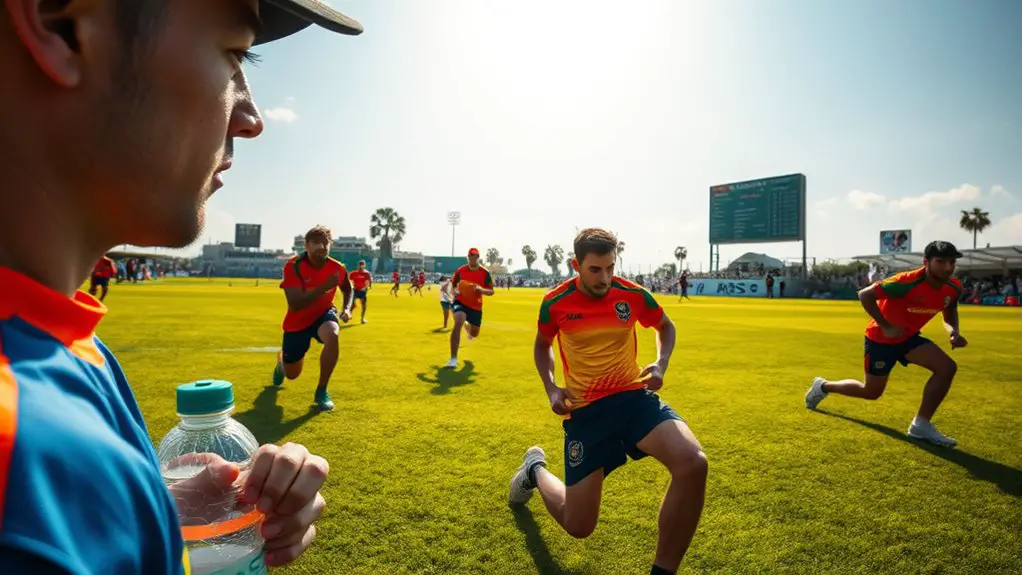Athletes have lower heart rates because their cardiovascular fitness is greatly enhanced. Their hearts pump more blood with each beat, boosting oxygen delivery even during rest. This efficiency means they don’t need to beat as fast to support their body’s demands. Additionally, regular training strengthens heart function and improves recovery times. By understanding these factors, you can appreciate how athletes optimize their performance and health. There’s more to uncover about the fascinating connection between heart rate and fitness.
Understanding Resting Heart Rate
When you’re at rest, your heart rate plays an essential role in indicating your overall cardiovascular health. Your resting heart rate, the number of beats per minute when you’re calm, reflects how efficiently your heart operates. A lower rate suggests your heart’s been conditioned, often a sign of good fitness. This isn’t just a number; it’s your body’s way of telling you how well it’s adapting to stressors. If you’re seeking freedom in your physical pursuits, understanding your resting heart rate can empower you. Keeping track allows you to notice changes over time, revealing insights into your health and wellness journey. Embrace this knowledge, and you’ll be closer to achieving the energy you crave. Additionally, a higher VO2 max indicates better endurance and performance, further contributing to an athlete’s overall cardiovascular efficiency.
The Role of Cardiovascular Fitness
Cardiovascular fitness plays an essential role in how efficiently your heart functions during physical activity. With improved fitness, you’ll notice enhanced heart efficiency, increased stroke volume, and a reduction in your resting heart rate. Proper hydration is also crucial for maintaining optimal cardiovascular performance, as it supports blood volume and nutrient transport. Understanding these changes can help you optimize your training and overall performance.
Enhanced Heart Efficiency
As you engage in regular physical activity, your heart becomes more efficient at pumping blood, a crucial aspect of cardiovascular fitness. This enhanced efficiency leads to greater heart rate variability, allowing your body to respond better to stressors. When you push your limits, you trigger aerobic adaptation, where your heart learns to deliver oxygen more effectively. This means you don’t have to work as hard to achieve the same output, giving you the freedom to enjoy your workouts more. A well-conditioned heart not only performs better but also recovers faster, giving you the edge in both exercise and daily life. Ultimately, this improvement in heart efficiency empowers you to pursue your passions with vigor and energy.
Increased Stroke Volume
Building on the enhanced heart efficiency, increased stroke volume plays an essential role in your overall cardiovascular fitness. When you engage in athletic training, your heart becomes more adept at pumping blood with each beat, allowing you to perform better and feel more energized. A higher stroke volume means your heart doesn’t have to work as hard, which keeps your heart rate lower during exercise and at rest.
| Stroke Volume | Impact on Performance | Benefits |
|---|---|---|
| Increased | Improved endurance | More oxygen delivery |
| Consistent training | Faster recovery | Reduced fatigue |
| Enhanced efficiency | Greater stamina | Better overall health |
Embrace this knowledge to enhance your training and enjoy the freedom of improved performance!
Resting Heart Rate Reduction
When you commit to regular athletic training, one of the most noticeable benefits is a reduction in your resting heart rate. This drop is a sign of improved cardiovascular fitness, allowing your heart to pump more efficiently. A lower resting heart rate reflects your body’s enhanced ability to recover from intense workouts and strenuous activity.
Here are some key points to take into account:
- Enhanced oxygen delivery: Your heart works less to supply oxygen to your muscles.
- Improved endurance: You’ll find it easier to sustain activity over time.
- Faster athletic recovery: Your body bounces back more quickly after exertion.
- Greater overall health: A lower resting heart rate is linked to reduced risk of heart disease.
Embrace the freedom that comes with being fit!
Heart Efficiency in Trained Athletes
In trained athletes, your heart becomes more efficient, allowing for enhanced stroke volume during exercise. This means your body can deliver oxygen more effectively, supporting better performance. Additionally, with reduced resting demand, your heart can recover quicker, optimizing overall cardiovascular health. Furthermore, quality sleep is essential for muscle recovery and growth, ensuring that athletes maintain their cardiovascular efficiency and overall performance.
Enhanced Stroke Volume
Although many people think of heart rate as the primary measure of cardiovascular fitness, trained athletes often experience enhanced stroke volume, which greatly boosts their heart efficiency. This means their hearts pump more blood with each beat, allowing them to perform at higher levels with less effort. Here’s why enhanced stroke volume is key for athletic performance:
- Increases oxygen delivery to muscles
- Reduces the need for a rapid heart rate
- Supports longer endurance during workouts
- Enhances overall cardiovascular health
Improved Oxygen Delivery
While many factors contribute to athletic performance, improved oxygen delivery stands out as a critical advantage for trained athletes. Your body becomes more efficient at oxygen uptake, allowing for enhanced endurance and performance. Increased blood flow means that muscles receive the oxygen they need to function effectively.
| Factor | Impact on Performance |
|---|---|
| Oxygen Uptake | Higher levels in athletes |
| Blood Flow | Enhanced circulation |
| Aerobic Capacity | Improved stamina |
| Recovery Rate | Quicker post-exercise |
This efficiency not only boosts your physical capabilities but also accelerates recovery time. With better oxygen delivery, you can push your limits and enjoy the freedom of movement that comes with being a well-trained athlete.
Reduced Resting Demand
Trained athletes experience a notable reduction in resting heart rate, a clear indicator of heart efficiency. This isn’t just about fitness; it’s a reflection of metabolic efficiency and energy conservation. Your heart doesn’t have to work as hard at rest, allowing for a more relaxed and efficient state.
- Enhanced oxygen delivery to muscles
- Lower overall cardiovascular strain
- Improved recovery times after exertion
- Greater energy reserves for performance
With a lower resting heart rate, you can enjoy the freedom of moving through your day with less fatigue. It’s all about your body adapting to demands, ensuring you can live life to the fullest while maintaining peak performance.
The Impact of Vagal Tone
Understanding the impact of vagal tone can greatly enhance your performance as an athlete. Vagal stimulation plays an essential role in regulating your heart rhythm, allowing for a more efficient cardiovascular system. When your vagal tone is high, your heart can beat more slowly and effectively, which means less strain during intense activities. This enhanced heart rate variability not only helps in recovery but also supports endurance. By focusing on practices that elevate your vagal tone, like deep breathing or meditation, you can promote a state of relaxation that translates into better performance. Embracing this knowledge empowers you to take control of your training, enabling you to push boundaries and achieve greater freedom in your athletic pursuits. Additionally, incorporating mindfulness techniques can further enhance your ability to maintain focus and composure during competitions.
Autonomic Nervous System Balance
Achieving a balance in your autonomic nervous system (ANS) is essential for optimizing athletic performance. When your ANS is finely tuned, it enhances your ability to recover and push your limits. This nerve balance is vital for maintaining a steady heart rate and efficient energy use.
- It promotes effective autonomic regulation, keeping your body in sync.
- A balanced ANS reduces stress and anxiety levels, improving focus.
- It enhances your recovery, allowing you to train harder.
- A well-regulated system boosts endurance and overall performance.
- Developing mental toughness can further improve your resilience and overall performance as an athlete.
Adaptations to Endurance Training
When your autonomic nervous system is well-balanced, it lays the groundwork for significant adaptations during endurance training. These endurance adaptations lead to improved efficiency in your cardiovascular system. As you consistently push your limits, your heart pumps more blood with each beat, meaning your heart rate can drop while you’re active. This is one of the key training effects that help you feel invigorated rather than fatigued. Your muscles also become more adept at utilizing oxygen, enhancing stamina and performance. With these adaptations, you’re not just training your body; you’re embracing a lifestyle that celebrates freedom and liveliness. Additionally, improved muscle efficiency allows for better oxygen usage, reducing fatigue during prolonged exercise. So, let your journey in endurance training empower you to access your true potential and experience life with renewed energy.
The Connection Between Heart Rate and Performance
As you push your limits in training, the connection between heart rate and performance becomes increasingly evident. Your heart rate isn’t just a number; it’s a crucial indicator of how well your body responds to different training intensities. By monitoring your heart rate, you can glean valuable insights into your performance metrics and tailor your regimen for best results.
Monitoring your heart rate reveals critical insights into your training, helping you optimize performance and push your limits effectively.
- Higher heart rates during workouts signal increased effort.
- A lower resting heart rate indicates better cardiovascular fitness.
- Tracking heart rate helps identify ideal training zones.
- Understanding heart rate variability can enhance recovery strategies.
- Incorporating active recovery strategies promotes improved heart rate management and overall endurance.
Ultimately, knowing how to read your heart rate empowers you to break free from limits and reach your performance potential.
Implications for Health and Longevity
Understanding the implications of heart rate for health and longevity reveals how essential it is to maintain an active lifestyle. When you embrace regular exercise, you’re not just enhancing performance; you’re revealing significant health benefits. Lower resting heart rates often indicate a more efficient cardiovascular system, which can reduce the risk of heart disease and other chronic conditions. This efficiency is a key factor in longevity—those who stay active tend to live longer, healthier lives. By prioritizing movement, you’re investing in your future. Each workout not only strengthens your body but also cultivates freedom from ailments that can limit your quality of life. Additionally, incorporating proper nutrition strategies post-exercise can significantly enhance recovery and overall heart health. So, seize the opportunity to keep your heart strong and your spirit vibrant.
Frequently Asked Questions
Can Heart Rate Vary Significantly Between Different Sports?
Yes, your heart rate can vary considerably between different sports. This phenomenon, known as sport specificity, occurs because each activity places different demands on your cardiovascular system. For instance, endurance sports like marathon running typically lead to lower resting heart rates due to increased efficiency, while high-intensity sports may cause higher rates during activity. Embracing these differences can help you tailor your training and understand your body’s unique responses to various sports.
Does Age Affect Heart Rate in Athletes?
Age can dramatically impact heart rate in athletes. As you age, your heart’s efficiency might decline, leading to a higher resting heart rate compared to your younger days. However, don’t despair! Many athletes maintain impressive cardiovascular fitness even as they grow older. This means you can still enjoy that exhilarating freedom of movement, keeping your heart strong and resilient, no matter the years you accumulate. Embrace the journey, and let your heart thrive!
How Does Hydration Influence Heart Rate?
Hydration directly impacts your heart rate by influencing fluid balance. When you’re well-hydrated, your blood volume stays ideal, allowing your heart to pump efficiently, which can lower your heart rate. On the flip side, dehydration can lead to thicker blood and increased heart strain, causing your heart rate to rise. Maintaining proper hydration guarantees you feel free and energized, enabling you to perform at your best without unnecessary cardiovascular stress.
Can Medications Alter an Athlete’s Heart Rate?
Yes, medications can alter an athlete’s heart rate. Certain drugs, like beta-blockers, can reduce heart rate and improve heart rate variability, while others might increase it. If you’re an athlete, it’s essential to be aware of how these medication effects could impact your performance and recovery. Always consult a healthcare professional before starting any medication, as understanding the potential effects can help you maintain the freedom to perform at your best.
What Are the Signs of Overtraining Related to Heart Rate?
If you’re experiencing overtraining symptoms, you might notice a consistently elevated resting heart rate or decreased heart rate variability. Your body’s struggling to recover, which can lead to fatigue, irritability, and a drop in performance. Pay attention to these signals; they’re your body’s way of saying it needs a break. Remember, finding balance in your training is key to maintaining both your physical freedom and overall well-being.




